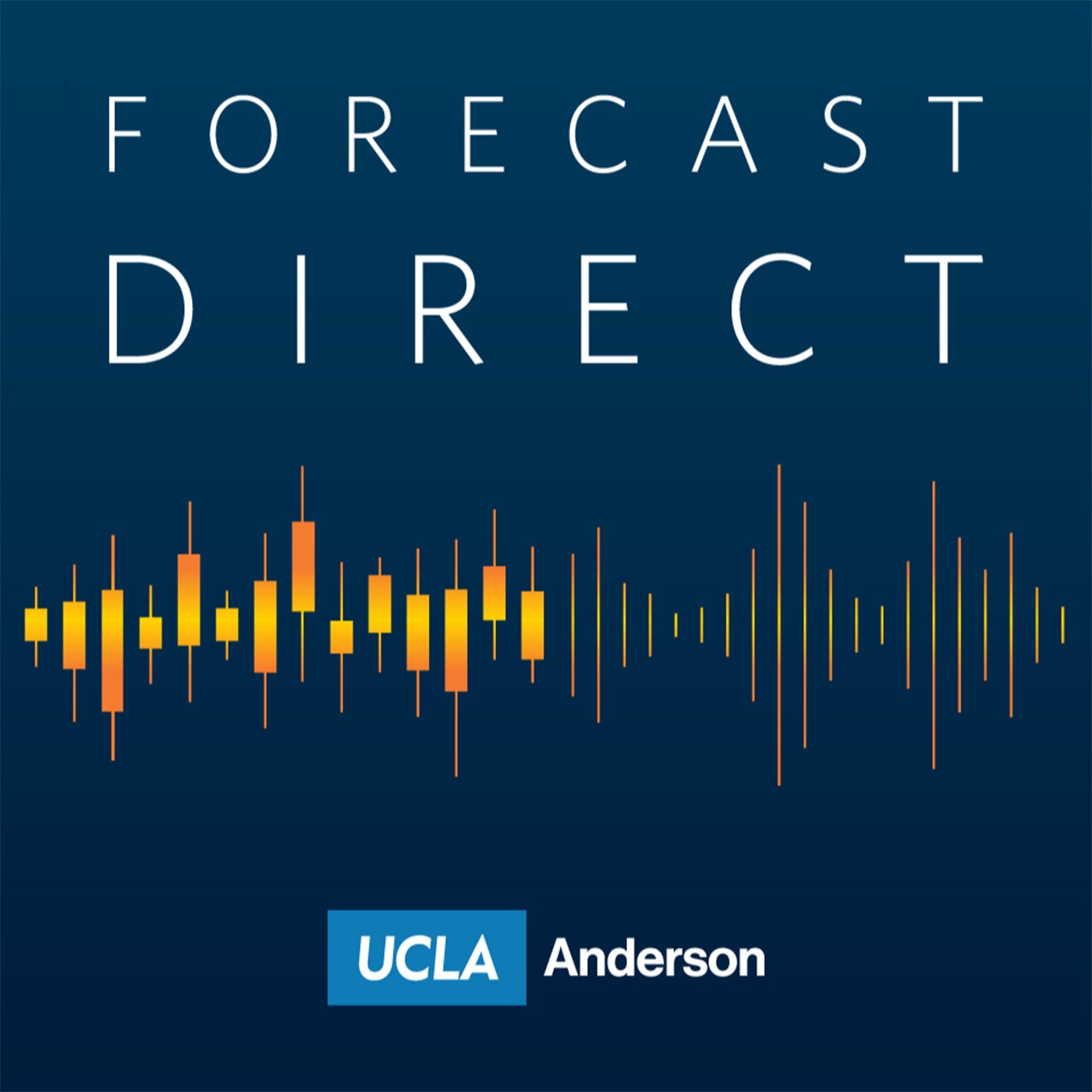Episodes

Thursday May 08, 2025
Forecast Direct No.34 - Social Media and Finance
Thursday May 08, 2025
Thursday May 08, 2025
In this episode of the Forecast Direct, Thomas Ash of the UCLA Anderson Forecast talks to Professor Tony Cookson of the University of Colorado, Boulder, Leeds School of Business. They discuss the finance social media ecosystem, what it is, how it functions, and some key research findings related to it. This is especially important as social media takes a larger share of attention away from traditional media.
Key takeaways:
* Key social media platforms for finance include StockTwits, Twitter (“FinTwit”), and Seeking Alpha. On these roughly 80% of posts are bullish and coverage even includes many tiny to mid‑cap firms. By contrast, traditional media outlets show more negative‑tilted information and skew toward large firms.
* A useful way to characterize different parts of social media research is where it can act as a lens to view typical human behavior, versus social media's role as a participant, itself driving trading and volatility.
* There is a difference between firm‑Level vs. market‑level signals on social media. Different social media platforms talk about the same things but tend to disagree on the prospects of individual firms. At the firm level, spikes in social‑media sentiment mildly predict positive returns, while attention spikes tend to predict negative returns. At the aggregated market‑level however the opposite is true for both sentiment and attention, pointing to key differences between the firm and market level signals.
* Echo‑chamber dynamics and fake‑news proliferation can degrade both the quality of information impounded into prices and investors’ trust in genuine signals.

Friday Feb 21, 2025
Friday Feb 21, 2025
In this episode of the UCLA Anderson Forecast Direct podcast, Clement Bohr interviews Nobel Prize-winning economist Joseph Stiglitz. The discussion centers around Stiglitz's latest book, "The Road to Freedom" and on some of his recent work on optimal taxation of corporate profits in the presence of market power.
- Understanding Neoliberalism and its Shortcomings Stiglitz explains the concept of neoliberalism, highlighting its emphasis on deregulated markets and minimal government intervention. He discusses how the fundamental theorems of welfare economics have been misunderstood to justify unregulated markets and argues that unregulated markets often lead to exploitation and monopolization rather than competition.
- The Economic Impact of Neoliberal Policies Since 1980 Since the rise of neoliberalism in the 1980s, the US economy has grown more slowly, with most income gains going to the top of the income distribution, leading to increased inequality. He attributes the slower growth and increased inequality to neoliberal policies and references the 2008 financial crisis as a result of deregulation in financial markets.
- Proposal for Reform Stiglitz advocates for a shift to progressive capitalism, similar to the policies promoted by early 20th-century presidents like Teddy Roosevelt. He outlines the key pillars of progressive capitalism aimed at addressing low economic growth and high inequality.
- Optimal Taxation of Corporate Profits Stiglitz discusses his new academic paper on corporate taxes where introduces the concept of market power wealth and its importance in determining optimal corporate tax rates. He shows that higher corporate tax rates on profits can lead to more investment and a more efficient allocation of capital when firms are able to expense their capital investments and R&D expenditures.

Tuesday Nov 26, 2024
Tuesday Nov 26, 2024
In this episode of Forecast Direct, we feature Dr. William Lee, Chief Economist at the Milken Institute. Dr. Lee focuses on enhancing capital access, financial stability, and job creation by improving global economic and regulatory conditions. He works with policymakers, thought leaders, and market participants to develop actionable solutions. Our conversation explores the economic impacts of tariff and trade policies during the second Trump administration, the trajectory of foreign direct investment in the U.S., supply chain resilience, and the dynamics of bilateral versus multilateral trade negotiations.

Wednesday Oct 23, 2024
Forecast Direct No. 31 - Racial Discrimination and Equity in the Housing Market
Wednesday Oct 23, 2024
Wednesday Oct 23, 2024
Racial discrimination in any market is a sign of a market failure and needs to be quantitively identified, to prompt policy-based steps towards equity.
In this episode, UCLA real estate economist, Sayantani hosts Alina Arefeva, Assistant Professor at the Department of Real Estate and Urban Land Economics, Wisconsin School of Business, who will discuss the presence and extent of racial discrimination in the housing market, through analyzing the differential impact of eviction moratorium on minorities. Professor Arefeva studies discrimination through a housing search model, and empirically quantifies a significant drop in the relative rental-housing-based response ratio to African Americans, after the end of the COVID eviction moratorium. She provides potential policy implications of the findings and implore the need for further research to weigh the intensified discrimination with the benefit of having more security for existing minority renters.

Thursday Jul 25, 2024
Forecast Direct No. 30 - Macroeconomic Impacts of Climate Change
Thursday Jul 25, 2024
Thursday Jul 25, 2024
The Macroeconomics of climate change provides frameworks to understand the overall impact. This approach complements the documented Microeconomic effects of climate change. In this episode, Forecast economist Thomas Ash hosts special guest Lint Barrage, Associate Professor and Chair of Energy and Climate Economics at ETH Zurich, to discuss important areas in this growing subfield such as the fiscal costs of climate change, clean innovation subsidies and recent updates to estimates of the economy-wide damages from climate change.

Friday Apr 26, 2024
Forecast Direct No. 29 - The Market Power of Technology
Friday Apr 26, 2024
Friday Apr 26, 2024
One of the most important questions today is about increasing inequality within the economy and society at large.
In this episode, we’re pleased to feature Mordecai Kurz, Joan Kenney Professor of Economics Emeritus at Stanford University, who will discuss his book The Market Power of Technology: Understanding the Second Gilded Age. Professor Kurz moves beyond the simple economic description of an economy comprised of labor and capital to a more complex one that includes technology and monopolization to uncover the important dynamics of inequality and the implications for an increasingly technological economy in the future.

Friday Dec 08, 2023
Friday Dec 08, 2023
After the meeting between President Biden and President Xi in San Francisco in November 2023, there has been a halt in the worsening of U.S.-China relations.
In this episode, we are joined by Martin Chorzempa, senior fellow from the Peterson Institute for International Economics, to talk about the latest developments in U.S.-China relations. Our discussion also covers the effects of the U.S. restrictions on semiconductor components on China over the past year, as well as the future prospects of this policy. We also explore the implications of China’s newly implemented data flow regulations for international businesses operating within the country.

Thursday Oct 26, 2023
Forecast Direct No. 27 - Climate Risk and the Overvaluation of the Housing Market
Thursday Oct 26, 2023
Thursday Oct 26, 2023
This month, we feature Zhiyun Li hosting a conversation with Jesse Gourevitch on climate risk and property overvaluation in the U.S. Jesse Gourevitch is a postdoctoral fellow on the Economics Team at the Environmental Defense Fund. His research focuses on the economic impacts of climate change and adaptation to climate risks. We discuss his recent research exploring the magnitude, geographic distribution, and driving factors of unpriced flood risk in the U.S. housing market.

Friday Sep 29, 2023
Forecast Direct No. 26 - Green Jobs in the United States
Friday Sep 29, 2023
Friday Sep 29, 2023
This month, we feature Zhiyun Li hosting a conversation with Ioana Marinescu and Mark Curtis on their paper about green jobs in the United States. Ioana Marinescu is an Associate Professor at the University of Pennsylvania School of Social Policy and Mark Curtis is an Associate Professor at Wake Forest University. Their recent research focuses on the the growth of renewable energy and how it benefits U.S. workers.

Monday Jun 26, 2023
Forecast Direct No. 25 - Immigration and the Provision of Public Goods
Monday Jun 26, 2023
Monday Jun 26, 2023
This month, we feature a conversation with Leo Feler and Mine Senses on immigration and the provision of public goods. Mine Senses is an Associate Professor of International Economics at the School of Advanced International Studies (SAIS) at Johns Hopkins University. Her current research focuses on the consequences of globalization on the labor market, with emphasis on quantifying the heterogeneous costs and benefits experienced by different segments of the population.

